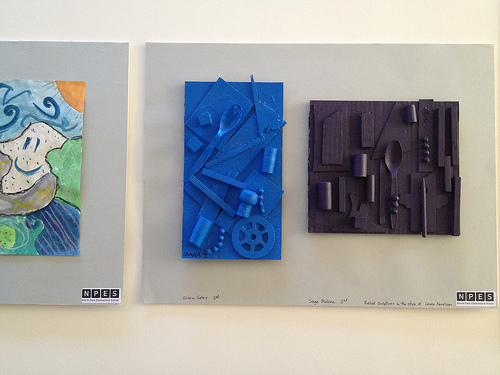
Conservation Unit (Part I)
 [flickr id=”8048204177″ thumbnail=”medium” overlay=”true” size=”original” group=”” align=”none”]
[flickr id=”8048204177″ thumbnail=”medium” overlay=”true” size=”original” group=”” align=”none”]
Two of my major goals this year with the blogging on Marginalia are to share some of the projects I create and to generate a lot of resource links for my future classroom. This post will offer a bit of both, as I am currently putting together an 8th grade unit with some of my cohort members on conservation that makes use of a lot of online resources. As the unit project is very large, I plan to share it over the next three blog posts. Part one is an annotated list of activities that integrate social studies, science, and language arts. In part two, I’ll share a plan for a family night project, and in part three, I’ll share a full lesson plan for this unit. Enjoy, and please let me know your thoughts!
Initiating Activity
- Individually, students will complete a pre-assessment that shows which daily objects they know to be recyclable. After the pre‐assessment, students will take turns reading aloud the poem titled “How Green is Our Borough?” by Eve Taylor. As a whole class, students will brainstorm what they know about the topic of conservation.
Science/Social Studies/Language Arts Integrated
- In a cooperative learning group, students will read and respond to the book Fire in the Wind by Dana M. Stein. The cooperative learning groups will prepare a response to the book in the form of a song, dance, short film, or skit.
- Individually, students will investigate household objects to determine which ones are made from recycled materials. Students can choose to draw the objects in their journal, make a list of the objects, or take photos of the objects and create a collage online. Students will estimate the total number of each recyclable object that their family uses each week. As a whole class, students will share their information and create a chart of their findings.
- Students will read an article from the New York Times titled “Urban Composting: A New Can of Worms” about a cultural movement towards composting. Students will then visit the Garfield Park Conservatory to tour the conservatory and to participate in a workshop on the benefits of composting food waste and how to do it for their own garden.
- In teams, students will each spend a week composting food waste from the school cafeteria for either the school garden or for a community garden.
- In teams, students will build a greenhouse from recycled bottles.
- In teams, students will make a list of the different waste materials that their school generates. Students will collect data to create a graph of total school usage for various waste materials. Students will then investigate what waste from their school can be recycled, reduced, or reused.
- In teams, students will prepare a short presentation for each area of the school (classrooms, school offices, and the cafeteria) about how they can reduce waste and present it to the staff.
- Students will explore the “Environment, Culture, & Conservation” Exhibit at the Field Museum. They will use the exhibit to find answers to questions on a worksheet and apply it to the particular culture/country they’ve been studying.
- The Urban Anthropology Team from the Field Museum will give a presentation in the classroom about Conservation and Culture initiatives in Chicago.
- Individually, students will read about the United State’s initiative to promote wind and solar energy. Students will then read an article from the Wall Street Journal titled, “Two thirds of World’s Solar Panel Installations Were in Europe Last Year.” In teams, students will build a solar powered robots. Students will journal a short reaction to the experience.
- In teams, students will explore an online interactive hydroelectric power map of the United States and compare Northwest, Southwest, Northeast, Southeast, and Midwest usage. Individually, students will write a reflection journal that hypothesizes which coast uses more power and explains why they believe that.
- Individually, students will track their carbon footprint for one week. Students will compare their findings in class. Students will use their discoveries to write a poem about their personal impact on the environment.
- Individually, students will make their own paper from recycled products. Students will then write a letter to a person from another country which lays out the process for making the paper.
- As a whole class, students will watch a video about oil production in the Middle East and take notes on how these cultures think differently about the environment. Students will then read an article from the New York Times titled “An Uphill Battle on Oil Dependency.” Individually, students will then journal about their discoveries and how these ideas compare to those in our own society.
- Students will research online renewable energy proposals or green initiatives of their choice from two of the following places: Sweden, Quebec, Brazil, Greece, Mexico, Thailand, Sudan, and Japan. In teams, students will discuss and compare the varying types of initiatives and proposals considered by each culture.
- Students will research online Illinois policies on a conservation issue of their choice. Students will then write a persuasive letter to a government official sharing their opinion of the policy.
- Students will look at NPR’s article titled, “Fukushima, Three Mile Island, Chernobyl: Putting It All In Perspective.” Students will hypothesize in their journals about the future effects of the use of nuclear energy on different cultures.
- Students will watch the BBC report titled, “Morogoro: The hub for commercial farming in Tanzania.” Students will discuss their reactions to this video.
- As a whole class, students will brainstorm and draft a proposal to their school’s administration regarding unused dry goods at their school
[flickr id=”8048170571″ thumbnail=”medium” overlay=”true” size=”original” group=”” align=”none”]
